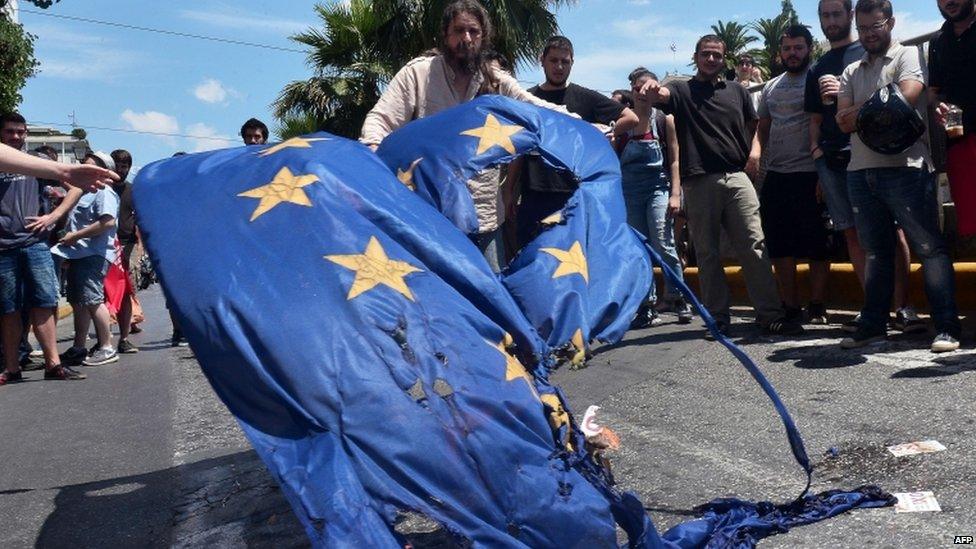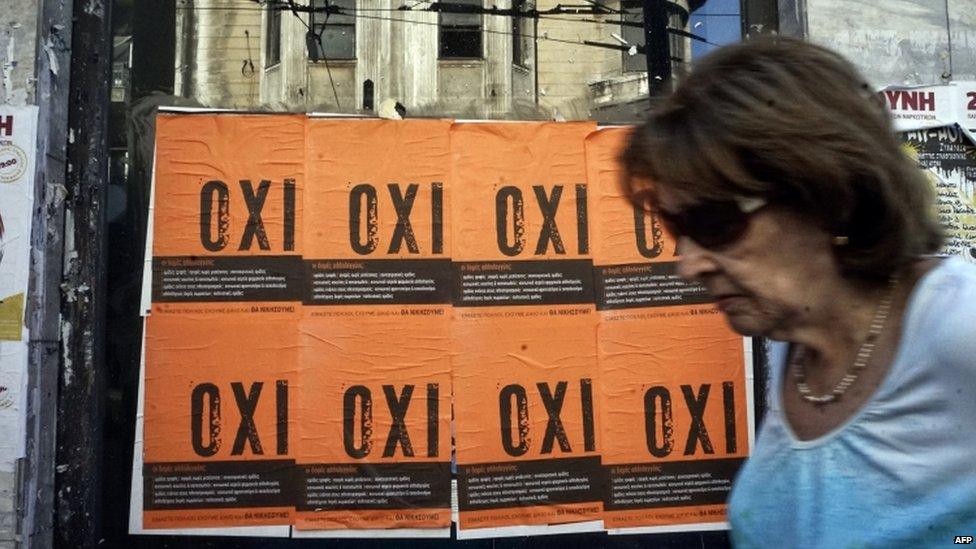Greek debt crisis: Did Tsipras change course?
- Published
Alexis Tsipras: "I want you to answer 'No' ... to open a new bright page in our history"
Did Alexis Tsipras really "change course dramatically" during yet another turbulent day yesterday, as many observers suggest?
I don't think he did, even if it might have felt that way in many finance ministries around Europe.
Yes, there have been dramatic swings between accommodation and defiance.
But if you are a supporter of the Greek prime minister you might be tempted to say the same about the mixed messages coming back from other political leaders around Europe.
Greece talks 'ruled out' before vote
Alexis Tsipras and his Greek gamble
From Mr Tsipras's perspective, he is still negotiating.
Yes, he initially agreed in a letter, external to accept many of the demands made by his creditors that he had rejected only days before.
This was a significant concession. But there were also significant caveats.
He still wanted changes to the creditors' proposals, and they were not insignificant.
And, crucially, he also tied the reform package explicitly to agreement on a third bailout that he had requested less than 24 hours earlier.
If the offer from the creditors had been accepted by the Greek government last weekend, it would have released €7.2bn (£5.1bn, $8bn) in funding from the old Greek bailout that has now expired, and several billion more from other sources.
But under the terms of Mr Tsipras's new counter-offer, it would also release €29.1bn of loans from the eurozone (no mention of the IMF) under a new bailout that has yet to be approved.
In other words, the same economic reforms in return for four times as much financial assistance. That hardly sounds like caving in to me.

Lenders' proposals - key sticking points
VAT (sales tax): Alexis Tsipras accepts a new three-tier system, but wants to keep 30% discount on the Greek islands' VAT rates. Lenders want the islands' discounts scrapped
Pensions: Ekas top-up grant for some 200,000 poorer pensioners will be phased out by 2020 - as demanded by lenders. But Mr Tsipras says no to immediate Ekas cut for the wealthiest 20% of Ekas recipients
Defence: Mr Tsipras says reduce ceiling for military spending by €200m in 2016 and €400m in 2017. Lenders call for €400m reduction - no mention of €200m

Most of the eurozone do not understand the Greek prime minister, or do not want to

Furthermore, when Mr Tsipras requested the third bailout he also said it should be part of a broader agreement that would involve debt re-profiling and debt restructuring.
Some of what that means - longer payment plans before debts have to be repaid - might be acceptable elsewhere in Europe.
Other parts of it - lower interest rates or writing debt off altogether - won't be.
So Alexis Tsipras was adding significant conditions to any agreement.
He wants what he has always wanted - a longer-term plan that includes substantial debt relief.

Prime Minister Alexis Tsipras has staked his future on a No vote and may well have backed himself into a corner
And that brings us back to the heart of the problem that has bedevilled negotiations over the past five months.
It is not just about the money. It is about the ideology.
It has been said many times that the financial gap between the two sides towards the end of the negotiations on the last bailout was not that big. But the ideological gulf was huge, magnified by mounting distrust on both sides.
Most of the rest of Europe's leaders either don't understand the Greek prime minister, or don't want to understand him.
They simply see the world - and the eurozone - in different ways.
Whether you agree or disagree with Mr Tsipras, there is "method in his madness". (Disclaimer - I'm not calling him mad).
Greece's first prime minister from the radical left may well be backing himself into a corner from which - in one way or another - there is no escape.
But if that happens, it looks like he will go down fighting.